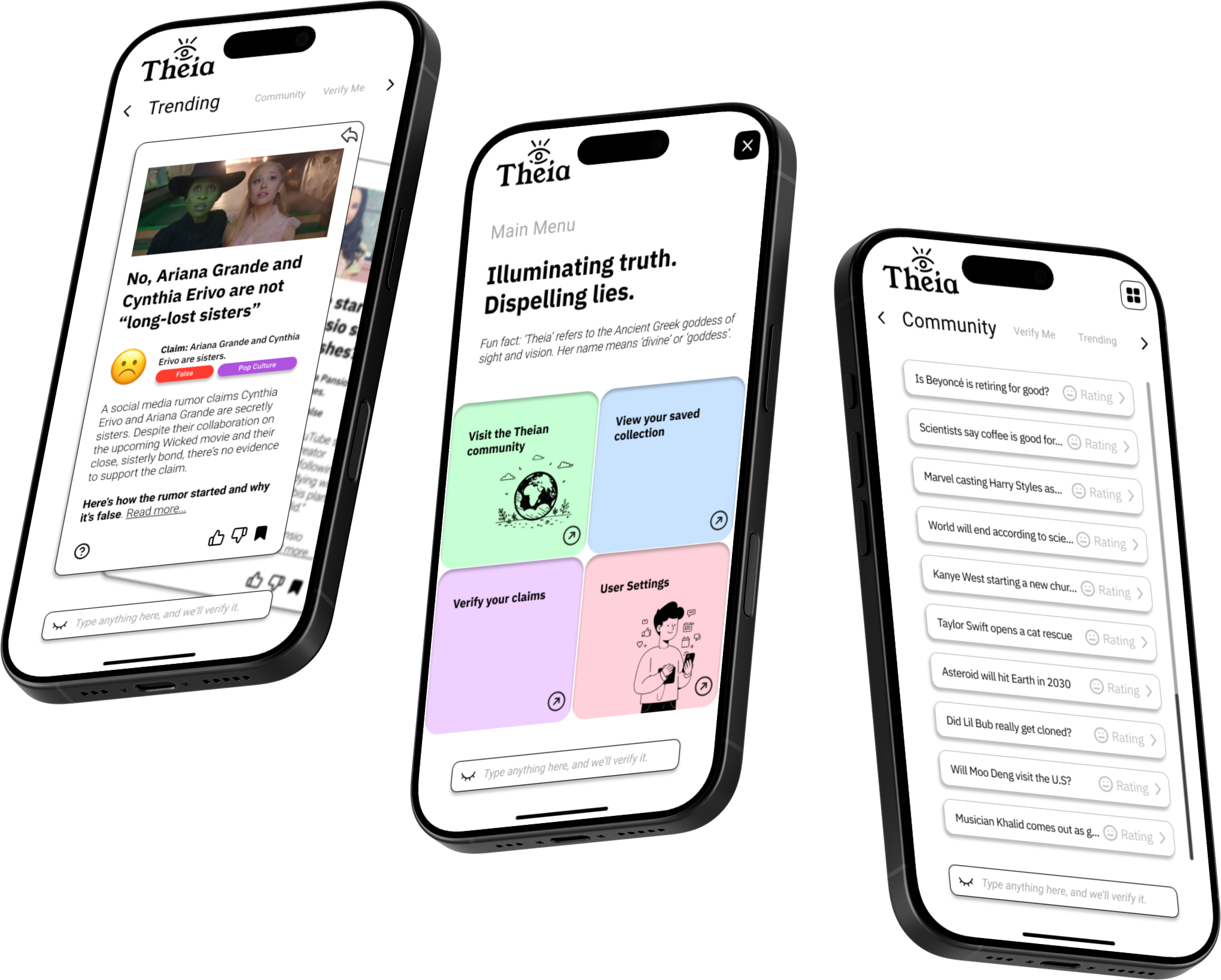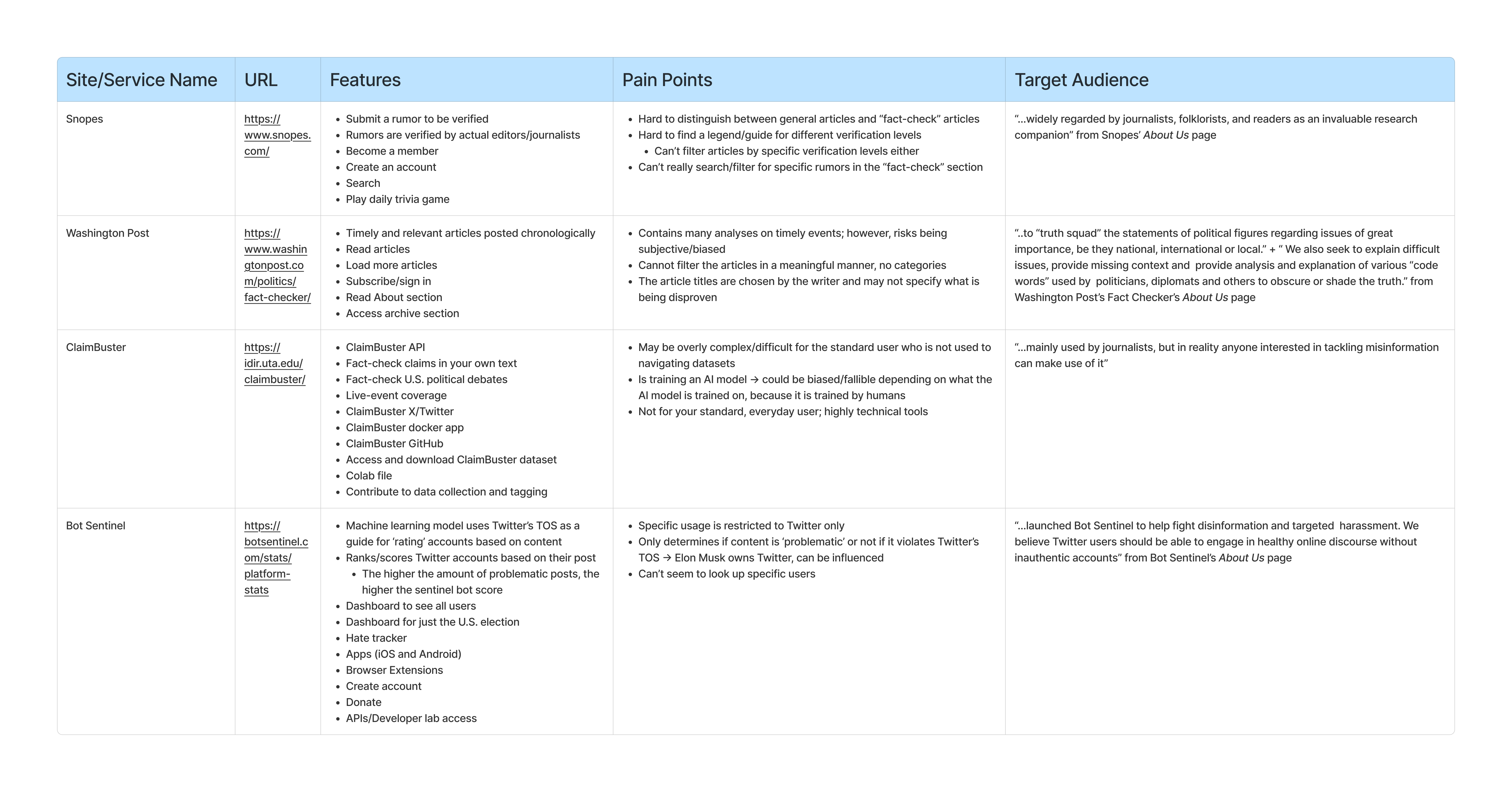
Theia is an AI-powered solution that combines real-time fact-checking with a user-driven community. Designed to feel familiar, Theia mimics popular social media apps, making it easy to use. With Theia, users can quickly verify or debunk claims, ensuring reliable, verified information at their fingertips.
Some call the 21st century the era of information. But others also call it the era of misinformation. This is only more prevalent with the rise in AI-generated content becoming increasingly integrated in our everyday lives– becoming the accelerant to the raging fire of misinformation. With AI now being capable of mimicking voices, writing news articles, and creating images of people nearly perfectly, how do we decipher truth from lies?
Theia is my proposed solution to this issue. Paradoxically, it uses AI to beat misinformation, but it also relies on a user community to fact-check claims in real time. It intentionally mimics the user experience of social media apps that many people have used before, so learning how to use it is as easy as install-open-start. With Theia, people can prove or disprove statements within seconds, in real time, and rest assured what Theia returns to them is true and verified.
How might we create a portable app or service that combats misinformation in real-time and verifies statements with accredited sources?
I began this project as one of passion, being a journalism major. At the Hussman School, I've been thoroughly educated on how to fact-check sources, how fallible AI truly is, and why the truth matters above all else. In a way, I created this app to help journalists.
First, I created a table to answer the five questions: who would use this product, what was this product, when would you use it, where would it be used, and why would a user want this product in the first place.

After outlining my thoughts, I created 3 potential use cases for this app:
These use cases helped me direct the flow of my later user interview. While I did generate a list of questions using ChatGPT, I found that I hardly used them during my interview. Instead, I kept it conversational, taking the time to listen to my interviewee thoroughly and constantly ask them "why". I found this would be instrumental to later development.
While I was preparing for my user interview, I created a brief branding guide to further visualize how I wanted the app to look and feel like:

Later, I would refine this concept to have a more consistent font selection, branding colors, and most notably, a logo!
I designed this logo by drawing inspiration from Theia's name– in ancient Greek mythology, Theia refers to the goddess of sight and vision. To convey this concept visually, I used the symbol of an open eye and the sun's rays in place of normal eyelashes for the logo. In a way, this logo conveys imagery of enlightenment, for the truth to be illuminated (by the sun), and for man to see the truth (by his eyes).

With my branding and user interviews complete, I then synthesized this preparation work into a final pitch statement, which helped me focus and tighten the project's scope into something tangible.
Central question: How might we create a portable app or service that combats misinformation in real-time and verifies statements with accredited sources?
Target audience: Anyone who has a vested interest in verifying their sources/statements, such as journalists, politicians, teachers, etc.
Links to at least three other digital experiences:
Description: In the era of social media, misinformation has become more apparent than ever especially with the rise of AI-generated content that are pushed to the front page without thorough verification due to the social media algorithm that prioritizes click rates over the truth. This cripples the collective intelligence of humanity by poisoning them with misinformation or bias that fails to give them a fuller picture of what is going on in the world around them. Additionally, with the sheer amount of content that is being pushed upon your average person, it's impossible to expect someone to verify every piece of information they consume in real-time. My solution is a portable app/software that people can carry with them and fact-check media in real-time within seconds, ideally through an auditory or somatic prompt. This information verification service would be assisted by a powerful AI bot that will scour reputable sources to verify the statement the user makes. I will present a rustic prototype and design a custom ChatGPT bot that verifies statements in real time.
To better understand what kinds of users would benefit/utilize this app the most, I created 3 user personas with the goal of each user coming from an entirely different background from the other. I created backstories, personalities, and fictitious identities to accomplish this goal.
As someone who creates characters for my tabletop games or stories as a passing hobby, I found this process to be both familiar and enjoyable. Creating a user persona is honestly like creating a new D&D character in a way. Is that what they call transferable skills?

Now that my user personas were defined, it was time to understand how they would navigate my app. I created a user flow chart to visualize this and to answer my question:

No matter the user's background, all users will have to go through this process to navigate the app. This was instrumental to creating my initial wireframes later in the process, as I only needed to refer to this user flow chart if I did not know what I should add next.
But wait! Aren't there already some services/softwares/apps that does the same thing as Theia? The short answer: yes. The long answer: yes, but not at the speed Theia is intended to do so. However, analyzing competitors and evaluating the market is a necessity especially if I intend to make this product a reality one day. I researched pre-existing fact-checking services available for users, prioritizing those that were open-source and/or free with an aim to beat misinformation.

The more astute readers will notice that these services were mentioned beforehand in my pitch statement. I was familiar with them before I began this project, but I wasn't aware how in depth some of these products went. Consequently, Theia should match this level of depth and utility in order to be a competitive product.
Currently, I am in the midst of polishing my high-fidelity mockups for future user testing. In the meantime, my low-fi wireframes and project FigJam board are available for view below.